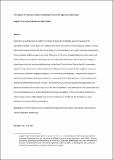Files in this item
The impacts of elicitation context on stated preferences for agricultural landscapes
Item metadata
| dc.contributor.author | Tinch, D. | |
| dc.contributor.author | Colombo, S. | |
| dc.contributor.author | Hanley, N. | |
| dc.date.accessioned | 2015-08-02T23:10:39Z | |
| dc.date.available | 2015-08-02T23:10:39Z | |
| dc.date.issued | 2015-02 | |
| dc.identifier | 145053818 | |
| dc.identifier | 357d9f81-692c-4ca5-883c-f326ebc156d9 | |
| dc.identifier | 84920939705 | |
| dc.identifier.citation | Tinch , D , Colombo , S & Hanley , N 2015 , ' The impacts of elicitation context on stated preferences for agricultural landscapes ' , Journal of Agricultural Economics , vol. 66 , no. 1 , pp. 87-107 . https://doi.org/10.1111/1477-9552.12080 | en |
| dc.identifier.issn | 0021-857X | |
| dc.identifier.uri | https://hdl.handle.net/10023/7096 | |
| dc.description | Funded by UK Research Council, ESRC, and NERC. | en |
| dc.description.abstract | Statements of willingness to pay (WTP) have been shown to be dependent upon the framing of the hypothetical market. In this paper we investigate the effects of variations in the timing and location of choice experiment questions concerned with conservation of a UK national park, as research involving measurement of psychological well-being suggests potential differences for the same individual dependent upon when and where preferences are elicited. We apply the choice experiment technique to the valuation of changes in upland agricultural and semi-natural landscapes in the Peak District National Park in the UK, to investigate whether timing and location of elicitation (context) affects the value associated with changes in ecosystem services under different management regimes. Four treatments are employed - using the same sample of individuals answering the same choice scenarios - to measure WTP ex-ante (off site), in situ (on site), and ex-post at two different time intervals (off site). We show that our on-site (in situ) treatment generates very different estimates of preferences than any of the off-site treatments. That stated preferences associated with environmental goods are so context dependent may have implications for the use of stated preferences in policy analysis in terms of identifying how environmental policy is funded and the divergence in value attributed to sampling different populations. | |
| dc.format.extent | 21 | |
| dc.format.extent | 340037 | |
| dc.language.iso | eng | |
| dc.relation.ispartof | Journal of Agricultural Economics | en |
| dc.subject | Cost–benefit analysis | en |
| dc.subject | Choice experiments | en |
| dc.subject | Agricultural landscapes | en |
| dc.subject | Public goods | en |
| dc.subject | National parks | en |
| dc.subject | Context-dependent preferences | en |
| dc.subject | S Agriculture (General) | en |
| dc.subject | NDAS | en |
| dc.subject | SDG 3 - Good Health and Well-being | en |
| dc.subject.lcc | S1 | en |
| dc.title | The impacts of elicitation context on stated preferences for agricultural landscapes | en |
| dc.type | Journal article | en |
| dc.contributor.institution | University of St Andrews. Geography & Sustainable Development | en |
| dc.identifier.doi | 10.1111/1477-9552.12080 | |
| dc.description.status | Peer reviewed | en |
| dc.date.embargoedUntil | 2015-08-03 |
This item appears in the following Collection(s)
Items in the St Andrews Research Repository are protected by copyright, with all rights reserved, unless otherwise indicated.

